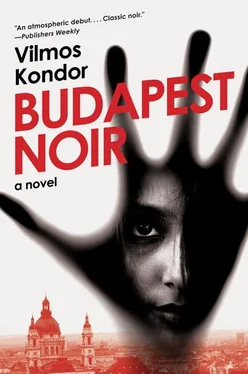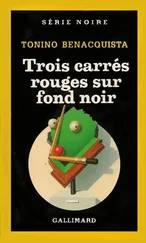Gordon took off his overcoat and pushed his hat back from his forehead, giving the room a thorough once-over. Finally he found the person he was looking for. Jenő Strausz was standing not far from the ring, regaling two young men in shorts with his stories, as they listened with wide-open eyes. Indeed, Strausz had a story worth telling: he’d defeated Ralf Geyling in the international championship held in Budapest in February 1912. Strausz looked hardly a day older, and almost twenty-five years had passed. He might have been nearing fifty now, but every ounce of his almost two-hundred-pound frame was pure muscle. He stood out in the crowd, with his short-cropped hair, slightly stooped back, and meticulously shaved mustache. For decades he’d been raising the next generation of boxers and had played a role in discovering several greats.
At that moment, Strausz, having caught a glimpse of Gordon, broke into a smile and opened his arms wide. “Zsigmond! Welcome! I wouldn’t have thought you could make it.”
“No one can be better than Harangi,” Gordon replied, “but I just had to see this butcher from Csepel for myself. Does he have a name?”
Strausz knit his brows. “You won’t believe it. Bruno Butcher.”
“Bruno the Butcher,” said Gordon.
“No, Bruno Butcher,” said Strausz. “Just like that. Look, it could be worse. He could be Béla Baker.”
“And what is his real name?”
“We don’t know. He rose through the ranks of the Csepel Workers Bodybuilding Club, and everyone called him Bruno Butcher even then. That can’t be his real name, but it doesn’t really matter.”
“Have you seen him fight?”
“If I’d seen him,” replied Strausz, “I probably wouldn’t even be here. Either he’s just the same as all the other coal heavers and butchers out there—and then there’s no sense seeing him more than once—or else I’ll give him my every spare moment to make sure that he can think a little, too, and not just punch a big one.”
“Who is he up against?”
“Micsicsák,” said Strausz with a dismissive wave.
“Then it’ll be a quick, bloodless match,” replied Gordon, glancing at the far side of the ring. He did a double-take. “Am I right that that man there is Antal Kocsis?”
“You certainly are. Where he came from, and when, I haven’t a clue, but here he is.”
Winner of the gold medal in the flyweight class in the 1928 Amsterdam Olympics, Kocsis had emigrated to America in early 1930 and hadn’t been seen in Hungary since. Rumors concerning his fate had surfaced regularly: he’d drunk away his money; his brain had been pummeled into jelly; he’d signed a contract in South America; and so on. Gordon knew not a single one was true. Even in America, Kocsis had made a name for himself in boxing, but on account of his good heart, he was constantly mired in financial struggles. He never could say no if a fellow Hungarian American asked him for a loan. Of course, he never saw the money again.
Squeezing his way through the crowd, Gordon headed over to Kocsis. The thin little fellow had his hair combed back and set with Brilliantine, and he was wearing a well-tailored suit and his familiar kindly smile.
“Antal!” Gordon greeted him. “Antal, what on earth are you doing here?”
Kocsis turned around, and on seeing Gordon he gave him a hug. “Zsigmond! For crying out loud, it’s so good to see you. When was it we last met?”
“April 27, 1930,” replied Gordon at once. “You were up against a Polish guy, and in the sixth round you knocked him out. Wajda—that was his name, wasn’t it?”
“I couldn’t say,” said Kocsis, patting Gordon on the side, “you remember better than I.”
“I did write about it, after all.”
“You wrote about every match of mine you could make it to.”
“I tried being there as often as I possibly could. Say, Antal, you just got back home, right?”
“Right,” said Kocsis.
“Were you there at the fight between Louis and Schmeling in New York?”
“You bet I was.”
“I want to know everything. Every single jab, hook, stick and move, clinch, block, and knockdown. The whole thing.”
Kocsis’s eyes lit up as he began recounting the legendary bout. He was so caught up in the story that he practically played out each and every round. A crowd soon formed beside Gordon and Kocsis. Even Strausz edged closer, but there were so many people standing there that he had to step up on the edge of the ring.
“And then Schmeling did a stick and move, dancing about and jerking his head out of the way again and again, blocking with his right hand. And then Louis approached. Schmeling held him in, and when Louis wasn’t paying attention, Schmeling gave him a right hook, bang , and then another, and then into his belly, bang, bang, bang . . .” Kocsis continued fervently, and Gordon was so into it himself that he began involuntarily mimicking Kocsis’s movements, grunting at the heavier blows and counting right along with Kocsis over the downed Louis. They were so caught up in it all that they hadn’t even noticed that Bruno Butcher was already into the second round with Micsicsák.
Surprisingly, Bruno Butcher looked only like a middleweight: he hardly had a belly, and his arms were long and muscular. Micsicsák didn’t know how to handle him. In the fifth round, all at once the butcher threw a merciless straight right into the pit of his willowy opponent’s stomach. Micsicsák dropped to the ground and didn’t move. The head referee leaned over him and started counting, and when Micsicsák still didn’t move, he called in the doctor. He raised the butcher’s right hand into the air.
Gordon waited a bit, then turned to Kocsis. “Antal, so what’s it all about, a jab in the pit of the stomach?”
“What do you mean?” asked the boxer.
“Did Micsicsák collapse because he wasn’t prepared for the jab, or . . .”
“Zsigmond, you can’t really prepare for this sort of thing—especially not from a beast like this butcher.”
“Let me ask one more thing. What happens when someone levels a jab that strong into the pit of the stomach of, say, a woman?”
Kocsis sighed. “What are you getting at?”
“Just a question, nothing else.”
“Well, that could have a bad ending.”
“How bad?”
“In the worst-case scenario, the girl might even get killed. Why do you ask? Are you preparing for something?”
“Me? Nothing. I’m just working on a case in which something similar happened.”
“It all comes down to chance. I’ve been hit like that in my gut so hard the air just stopped dead in its tracks inside me and I couldn’t even stand up. The air just got stuck, simple as that. It’s practically impossible to prepare for a jab like the one the butcher just threw. His hand just shot in, and Micsicsák couldn’t block. That was that.”
Gordon nodded. Soon the next match began, and Gordon stood there between Strausz and Kocsis until six in the evening: they lambasted the boxers and analyzed the punches, and during intermissions they conjured up famous old bouts. But around six, Gordon sighed. “I’ve got to be off.”
“Don’t tell me you’re going to work?” asked Strausz.
“Yes. In a certain sense, yes.” Gordon shook hands with Kocsis and with Strausz, said his good-byes to the others on his way out, and then he hurried out onto Podmaniczky Street and headed toward Berlin Square.
Falk Miksa Street—which ran from the Grand Boulevard near the Margaret Bridge to the Parliament building—was almost completely deserted. Expensive chandeliers, curtains, and an occasional fleeting shadow shone clearly from behind the tall windows of the narrow thoroughfare’s elegant apartments. Gordon found the address easily. Standing in front of the building , he even found himself admiring what a grand neighborhood Red Margo occupied. It was understandable, of course: since Margo supervised and otherwise managed the girls in the apartment on Báthory Street, she had to live nearby. At the same time, Gordon was certain that the flat was not her own, but that the rent was paid for by the secretive Mr. Zsámbéki who had bought the black-haired girl from Csuli.
Читать дальше
Конец ознакомительного отрывка
Купить книгу












